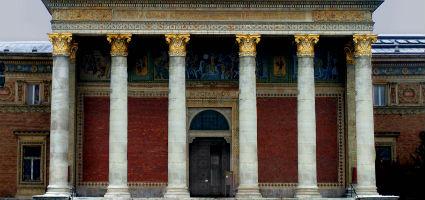2024. May 4. Saturday
Kunsthalle - Budapest
 |
Address: 1146, Budapest Dózsa György út 37.
Phone number: (1) 460-7000, (1) 363-2671
E-mail: info@mucsarnok.hu
Opening hours: Tue-Wed 10-18, Thu 12-20, Fri-Sun 10-18
|
The exhibition has closed for visitors.
2014.04.03. - 2014.05.04.
Museum tickets, service costs:
|
Ticket for adults
|
1200 HUF
|
|
|
Ticket for adults
(valid for the Kunsthalle and the Ernst Museum)
|
1400 HUF
|
|
|
Group ticket for adults
(from over 10 people)
|
800 HUF
|
/ capita
|
|
Ticket for students
(EU citizens from the age of 6 to 26 )
|
600 HUF
|
|
|
Ticket for students
(valid for the Kunsthalle and the Ernst Museum, 6-26 years of age)
|
700 HUF
|
|
|
Group ticket for students
(from over 10 people)
|
400 HUF
|
/ capita
|
|
Ticket for pensioners
(valid for the Kunsthalle and the Ernst Museum, 62-70 years of age)
|
700 HUF
|
|
|
Ticket for pensioners
(EU citizens from the age of 62 to 70)
|
600 HUF
|
|
|
Ticket for families
(1 adults + 2 children)
|
1800 HUF
|
/ family
|
|
Ticket for families
(2 adults + 2 children)
|
2400 HUF
|
/ family
|
"The heavenly motions... are nothing but a continuous song for several voices, perceived not by the ear but by the intellect, a figured music that moves with its dissonant tensions, syncopes and cadences toward a preplanned, hexachord clausure, setting landmarks in the immeasurable flow of time.” Johannes Kepler: Harmonices Mundi (Harmonies of the World, 1619)
Musical inspiration and engineering ingenuity come together in the performative sound installation entitled Cycloïd-ε. The work, created by Cod.Act, an artist duo of Swiss brothers André (1967) and Michel Décosterd (1969), is based on a formal analysis of the relationship between sound and movement. Cod.Act’s artworks, which mostly constitute performative sound-making devices, are often inspired by the natural sciences.
The basic concept of Cycloïd-ε, for instance, is the creation of seemingly natural oscillations and related sound effects within in a system that is also harmonic in its movement. The result then allows for manifold interpretations: Cycloïd-ε simultaneously reminds us of a mock-up of the Pythagorean model of the universe playing the music of the spheres and a futuristic robot that is not quite anthropomorphic, but bears human intelligence.
The horizontal pendulum structure was constructed by linking five individual pendulums, each of which is a musical instrument that produces (pre-recorded, orchestral) sound, depending on the movement of the sculpture. As a result of their complexity and the sudden, rapid changes in the cycloid movements of the pendulums, the manifesting sound is not clear, but transforms into hybrid resonances. The musical parts, nevertheless, always remain in harmony.
Cod.Act grounds its works in technical and scientific enquiry, rather than the traditions of avant-garde art. Their installations, however, are objects that can be interpreted as works of art, where the relevance of aesthetic approach, as opposed to industrial applicability, is clear explicit. Cycloïd-ε was created in 2009. Since then, it has been featured at numerous festivals and art events, winning, among others accolades, the Distinction Award of Ars Electronica in Linz and the Grand Prize of the Japan Media Arts Festival held in Tokyo. The artist duo is presently working on realizing a number of new installations.
Musical inspiration and engineering ingenuity come together in the performative sound installation entitled Cycloïd-ε. The work, created by Cod.Act, an artist duo of Swiss brothers André (1967) and Michel Décosterd (1969), is based on a formal analysis of the relationship between sound and movement. Cod.Act’s artworks, which mostly constitute performative sound-making devices, are often inspired by the natural sciences.
The basic concept of Cycloïd-ε, for instance, is the creation of seemingly natural oscillations and related sound effects within in a system that is also harmonic in its movement. The result then allows for manifold interpretations: Cycloïd-ε simultaneously reminds us of a mock-up of the Pythagorean model of the universe playing the music of the spheres and a futuristic robot that is not quite anthropomorphic, but bears human intelligence.
The horizontal pendulum structure was constructed by linking five individual pendulums, each of which is a musical instrument that produces (pre-recorded, orchestral) sound, depending on the movement of the sculpture. As a result of their complexity and the sudden, rapid changes in the cycloid movements of the pendulums, the manifesting sound is not clear, but transforms into hybrid resonances. The musical parts, nevertheless, always remain in harmony.
Cod.Act grounds its works in technical and scientific enquiry, rather than the traditions of avant-garde art. Their installations, however, are objects that can be interpreted as works of art, where the relevance of aesthetic approach, as opposed to industrial applicability, is clear explicit. Cycloïd-ε was created in 2009. Since then, it has been featured at numerous festivals and art events, winning, among others accolades, the Distinction Award of Ars Electronica in Linz and the Grand Prize of the Japan Media Arts Festival held in Tokyo. The artist duo is presently working on realizing a number of new installations.